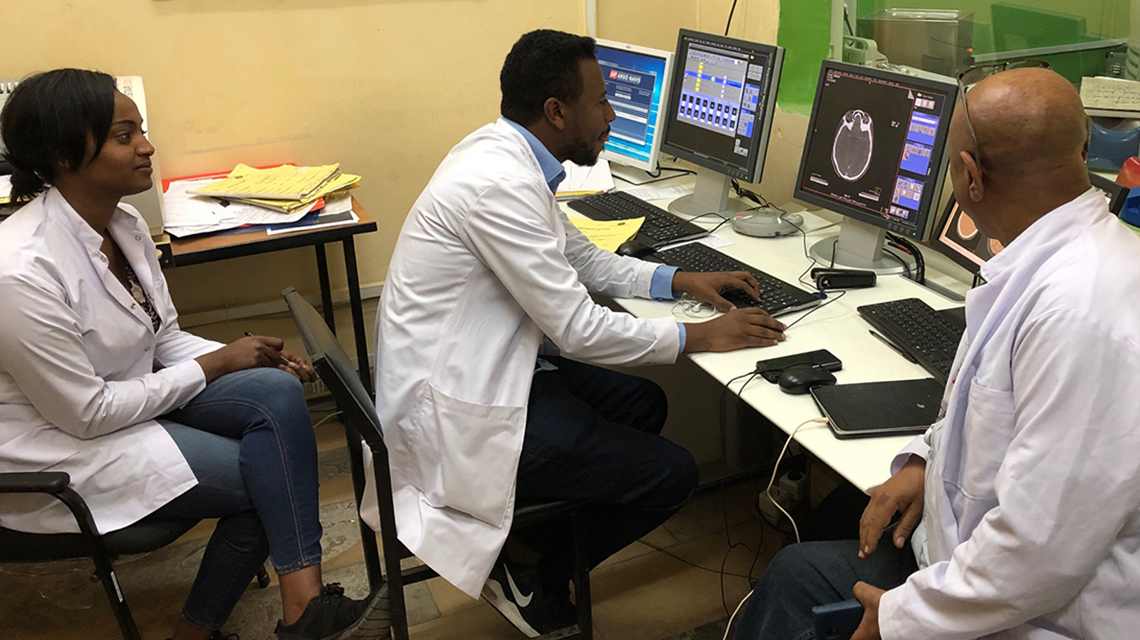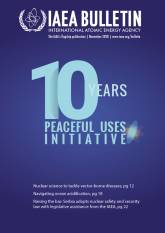
If you would like to learn more about the IAEA’s work, sign up for our weekly updates containing our most important news, multimedia and more.
Nuclear Technology for Cancer Care
IAEA projects provide a dose of support
Carley Willis

Oncology resident Fahin Osman is using a CT simulator donated by the IAEA to analyse the scan of a patient at Ethiopia's Black Lion Hospital. (Photo: M. Gaspar/IAEA)
Around the world, one in six deaths is caused by cancer. Many countries are looking to the IAEA for support in comprehensive cancer care, equipment and training to address the growing cancer burden.
There are 16 projects supported through the Peaceful Uses Initiative (PUI) addressing cancer worldwide and contributing to Sustainable Development Goal 3: Good health and well-being. Some examples of IAEA projects using nuclear technology to improve cancer care around the world are provided below.
Strengthening National Capacities in Nuclear Medicine and Radiotherapy to Provide Quality Service to the New Cancer Center is supporting Burkina Faso in the construction of its first radiotherapy facility. Under the project, two nuclear medicine physicians are participating in a four-year training fellowship in the Department of Nuclear Medicine of the Bab El Oued University Hospital in Algeria, while others have trained at institutions in Belgium and Morocco, gaining expertise in nuclear medicine and radiotherapy.
Establishing National Capacity for an Integrated Approach to Early Detection, Diagnosis, Management, Prevention and Research on Cancer and Radiation Safety is a project aimed at expanding early detection, diagnosis and treatment services for cancer in Kenya. Thanks to this project, in August 2020, the radiotherapy department of the Kenyatta National Hospital in Nairobi procured a computed tomography (CT) scanner, a device that scans the part of the body to be treated with radiation to determine the most appropriate cancer treatment plan. The project has also helped the training of experts, contributing to sustainable and accessible cancer treatment.
Expanding Radiotherapy and Nuclear Medicine Services for the Diagnosis, Curative and Palliative Treatment of Cancer Patients and the Efficient Diagnosis and Treatment of Other Diseases focuses on achieving comprehensive cancer care by widening the availability of related services throughout Ethiopia. By establishing radiotherapy and nuclear medicine facilities at five hospitals, advanced cancer care will be accessible outside the country’s capital, Addis Ababa. In 2019, there was only one operational radiotherapy machine in the country, making the average waiting time for treatment one year – by which time 70 per cent of patients were in the final stages of the disease. With more equipment in Ethiopia’s hospitals and over 25 experts trained, cancer prevention and cancer care are becoming more accessible across the country.
Providing Patients with Access to Public Nuclear Medicine Services for Early Diagnosis and Treatment is aimed at improving the quality of life for cancer patients in Paraguay. This is achieved through efficient diagnosis and corresponding therapy, such as with the country’s first hybrid imaging system at the Health Sciences Research Institute in Asunción, the country’s capital. Additionally, nuclear medicine equipment and shielding devices to ensure the safe use of radiopharmaceuticals – drugs containing radioactive isotopes used in cancer treatment – were provided, ensuring the project’s longevity. Through the support of the PUI, an increasing number of patients now have access to brachytherapy – a form of radiation therapy used to treat cervical cancer – with new equipment available at Paraguay’s National Cancer Institute. Fellowships to train national experts, as well as expert missions to support the development of clinical protocols, took place as part of the project.
Strengthening National Capacities for Diagnosis and Treatment of Cancer Patients aims to reduce cancer mortality in Peru. It is focuses on helping hospital staff update their knowledge of the use of ionizing radiation for effective cancer treatment, with a view to establish standardized processes, protocols and procedures. As a four-year project concluding in 2020, seven training courses have taken place on topics such as basic clinical radiobiology, quality management systems in a clinical practice and immobilization techniques for technicians. Experts travelled to Peru to assess cancer care services and provide advice and technical guidance. Fellowships enabling the participants to receive hands-on training were organized for young professionals to strengthen diagnostics and treatment capabilities using radiation medicine. Four portable digital radiographic mobile X-ray systems were installed at two hospitals in northwestern Peru, improving the infrastructure of the hospitals and the range of care they can provide.
Strengthening Capacity for Cervical Cancer Control through Improvement of Diagnosis and Treatment aims to reduce cervical cancer mortality by strengthening diagnosis and treatment availability in cancer control programmes. Beneficiaries of this initiative include 27 countries, such as Kyrgyzstan and Mongolia, which have both received ultrasound machines. Additionally, over 60 participants have been trained through fellowship programmes and training courses. To ensure the longevity and long term success of the project, an online learning platform was developed for professionals in the field of nuclear medicine, enabling them to keep abreast of developments, best practices and new findings in the field.
Related resources
- Cancer
- Cancer treatment: Radiotherapy
- Radiotherapy in Cancer Care: Facing the Global Challenge
- Five Ways Nuclear Science Helps Cancer Patients
- Targeting Cancer with Nuclear Techniques
- World Cancer Day 2021 – Cancer Care and COVID-19: The IAEA's Response
- 10 Years PUI, IAEA Bulletin (Vol. 61/4, November 2020)
- Programme of Action for Cancer Therapy (PACT)




